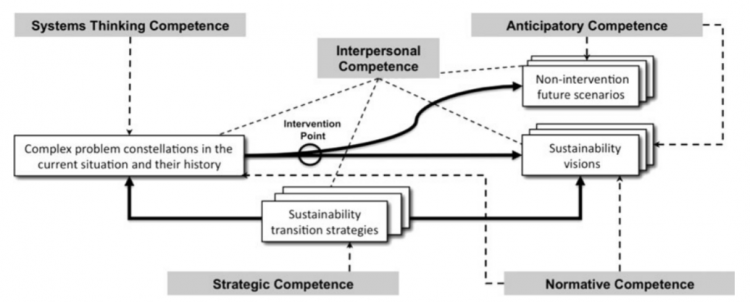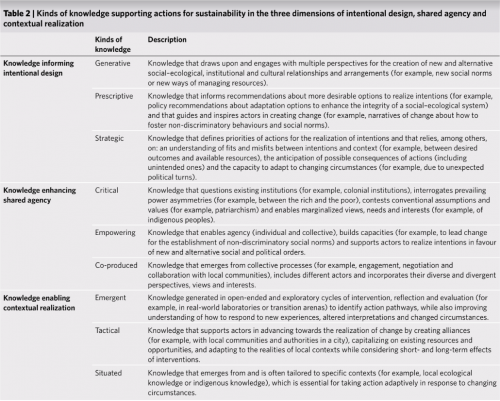Difference between revisions of "Design Criteria of Methods in Sustainability Science"
(→Agency) |
|||
| Line 14: | Line 14: | ||
[[File:SustainabilityCompetencies.png|750px|thumb|center|'''Key Competencies for Sustainability.''' Source: Wiek et al. 2011, p.206]] | [[File:SustainabilityCompetencies.png|750px|thumb|center|'''Key Competencies for Sustainability.''' Source: Wiek et al. 2011, p.206]] | ||
| + | |||
| + | == Knowledge for action-oriented sustainability science == | ||
| + | At the heart of Sustainability Science are, among other elements, the premise of intentionally developing practical and context-sensitive solutions to existent problems, as well as the implementation of cooperative research modes to do so jointly with societal actors, supporting social learning and capacity building in society. To this end, Caniglia et al. (2020) suggest three types of knowledge that should be developed and incorporated by Sustainability Science: | ||
| + | [[File:Types of knowledge for action-oriented sustainability science.png|500px|thumb|center|'''Types of knowledge for action-oriented sustainability science.''' Source: Caniglia et al. 2020, p.4]] | ||
== Interaction with stakeholders == | == Interaction with stakeholders == | ||
| Line 25: | Line 29: | ||
== References == | == References == | ||
* Wiek et al. 2011. ''Key competencies in sustainability: a reference framework for academic program development''. Sustainability Science 6. 203-218. | * Wiek et al. 2011. ''Key competencies in sustainability: a reference framework for academic program development''. Sustainability Science 6. 203-218. | ||
| + | * Caniglia et al. 2020. ''A pluralistic and integrated approach to action-oriented knowledge for sustainability.''. Nature Sustainability | ||
Revision as of 09:56, 14 October 2020
Annotation: This entry focuses especially on Methods of Sustainability Science. For a more general conceptual view on Methods, please refer to the entry on the Design Criteria of Methods.
Contents
Key Competencies in Sustainability
In 2011, Wiek et al. analyzed the prevalent literature and presented five Key Competencies that students of Sustainability Science should strive for. These competencies are as follows:
- Systems Thinking: Systems Thinking competency is the ability to analyze and understand complex systems including the dynamics in the interrelation of their parts. Systems thinking integrates different domains (society, environment, economy, etc.) as well as different scales (from local to global).
- Anticipatory: Anticipatory competency describes the ability to develop realistic scenarios of future trajectories within complex systems, including positive (e.g. a carbon-neutral city) and negative (e.g. flooding stemming from climate change) developments. This may include rigorous concepts as well as convincing narratives and visions.
- Normative: Normative competency refers to the ability to evaluate, discuss and apply (sustainability) values. It is based on the acquisition of normative knowledge such as concepts of justice or equality.
- Strategic: In simple terms, this competence is about being able to "get things done". Strategic competency is the capability to develop and implement comprehensive strategies (i.e. interventions, projects, measures) that lead to sustainable future states across different societal domains (social, economic, ecologic, ...) and scales (local to global). It requires an intimate understanding of strategic concepts such as path dependencies, barriers and alliances as well as knowledge about viability, feasibility, effectiveness and efficiency of systemic interventions as well as potential of unintended consequences.
- Interpersonal: Interpersonal competence is the ability to motivate, enable, and facilitate collaborative and participatory sustainability research and problem solving. This capacity includes advanced skills in communicating, deliberating and negotiating, collaborating, leadership, pluralistic and trans-cultural thinking and empathy.
Knowledge for action-oriented sustainability science
At the heart of Sustainability Science are, among other elements, the premise of intentionally developing practical and context-sensitive solutions to existent problems, as well as the implementation of cooperative research modes to do so jointly with societal actors, supporting social learning and capacity building in society. To this end, Caniglia et al. (2020) suggest three types of knowledge that should be developed and incorporated by Sustainability Science:
Interaction with stakeholders
Scientific methods can engage with non-scientific actors on diverse levels, depending on the extent of their involvement in the process of scientific inquiry. Interaction with stakeholder may be especially relevant in transdisciplinary research.
Here, we refer to four levels of interaction:
- Information: Stakeholders are informed about scientific insights, possibly in form of policy recommendations that make the knowledge actionable. This is the most common form of science-society cooperation.
- Consultation: Stakeholders provide information of interest to the researchers, e.g. in form of interviews. They are sources of information, but are not actively engaged in the scientific process.
- Collaboration: Stakeholders cooperate with academia, e.g. through one of the aforementioned methods, in order to jointly frame and solve a distinct issue.
- Empowerment: Stakeholders are enabled to tackle issues by themselves and are provided ownership for problems and their solution. Empowerment exceeds simple collaboration in that it creates skills for stakeholders to engage with problems on their own instead of involving academia anew for every arising issue.
References
- Wiek et al. 2011. Key competencies in sustainability: a reference framework for academic program development. Sustainability Science 6. 203-218.
- Caniglia et al. 2020. A pluralistic and integrated approach to action-oriented knowledge for sustainability.. Nature Sustainability

